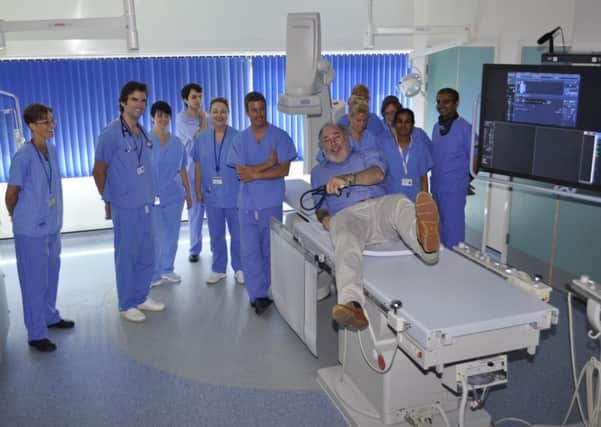Doctors get right to the heart of the matter


But this is precisely what consultant cardiologist Dr Mark Signy, and his team, do on a daily basis.
When I visited the new cardiac catheter laboratory in Worthing Hospital last Tuesday, I was awestruck at just how intricate and skilful the life-changing procedures in the lab were.
Advertisement
Hide AdAdvertisement
Hide AdAfter speaking with Mr Signy, and watching as he and his team inserted a stent into a narrowed artery in 65-year-old Ken Turrell’s chest, it was clear just how much cardiac health care in the county has improved in recent years.
When Mr Signy arrived at Worthing Hospital in 1988, he was the only NHS cardiologist in West Sussex. There are now seven in Worthing alone and more than 20 across the county.
He says the introduction of the cath labs in Worthing had been ‘life-changing’ for patients.
“When I first came, I had to take my patients down to St Thomas’ in London for angioplasty and there was up to a two-year waiting list,” he said. “Now, our waiting list for an elective angioplasty is about a month and it’s about three to four weeks for a pacemaker, with an inpatient stay of two days. The second lab has made a huge difference.”
Advertisement
Hide AdAdvertisement
Hide AdThree types of procedure are performed in the labs: angiogram – a thin tube gets inserted into the artery while an xray is used to look for narrowing or blockages; angioplasty – a stent implant to widen narrowed or blocked arteries; and pacemaker implants – to maintain a regular heartbeat. Almost every procedure is carried out under local anaesthetic.
Last year was the first full year that both labs were open together. In that time 1,589 angiograms were carried out, 522 angioplasties took place and 459 pacemakers were implanted.
On an average day, 18-20 angiograms take place.
“Stuff people used to have to go to big centres for has been devolved down to here,” said Mr Signy. “We don’t do cardiac surgery but we do pretty much anything else here. It’s local, high quality and quick.”
Neither of the two cath labs at the hospital have been funded by the NHS. The cost of the first was covered by a lottery grant, while the second was funded by a public appeal and a large donation from the Friends of Worthing Hospital.
Advertisement
Hide AdAdvertisement
Hide AdMr Signy said: “The Friends of Worthing Hospital were fantastic. They brought in around £1 million in to this. It’s a wonderful organisation. They have been incredibly generous, particularly to cardiology.”
During his operation, Mr Turrell listened to the radio while the medical team worked to widen his artery.
Mr Signy, who has had a stent fitted himself, was aware that the procedure could be daunting for patients.
“It’s very daunting, even if you know what’s going on, but our staff relax people very well,” he said. “It’s incredibly clean and roomy so patients immediately get a positive vibe.”
Advertisement
Hide AdAdvertisement
Hide AdThe national mortality rate for angioplasty procedures is around one per cent, but Mr Signy said Worthing Hospital’s rates were currently ‘much less’ than that.
I asked Mr Signy if, despite his vast experience, he still got nervous when performing the procedures.
“The day I stop getting a slight tachycardia and that adrenaline, is the day I stop, as it’s not fair on the patients,” he said. “I think a little bit of pressure is quite a good thing.”